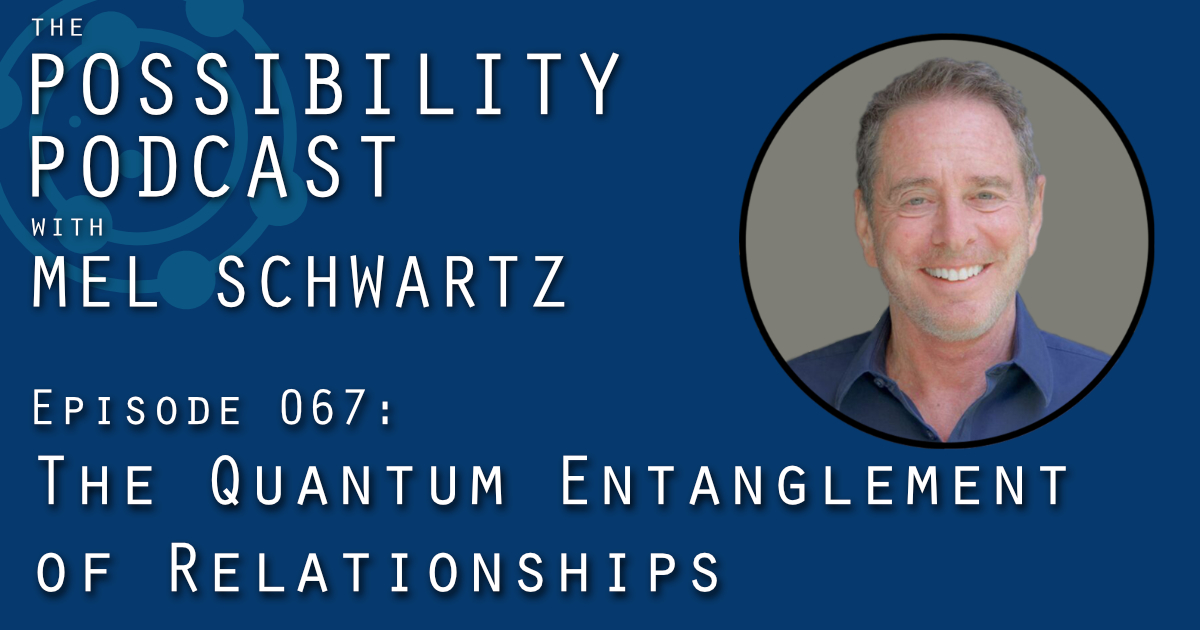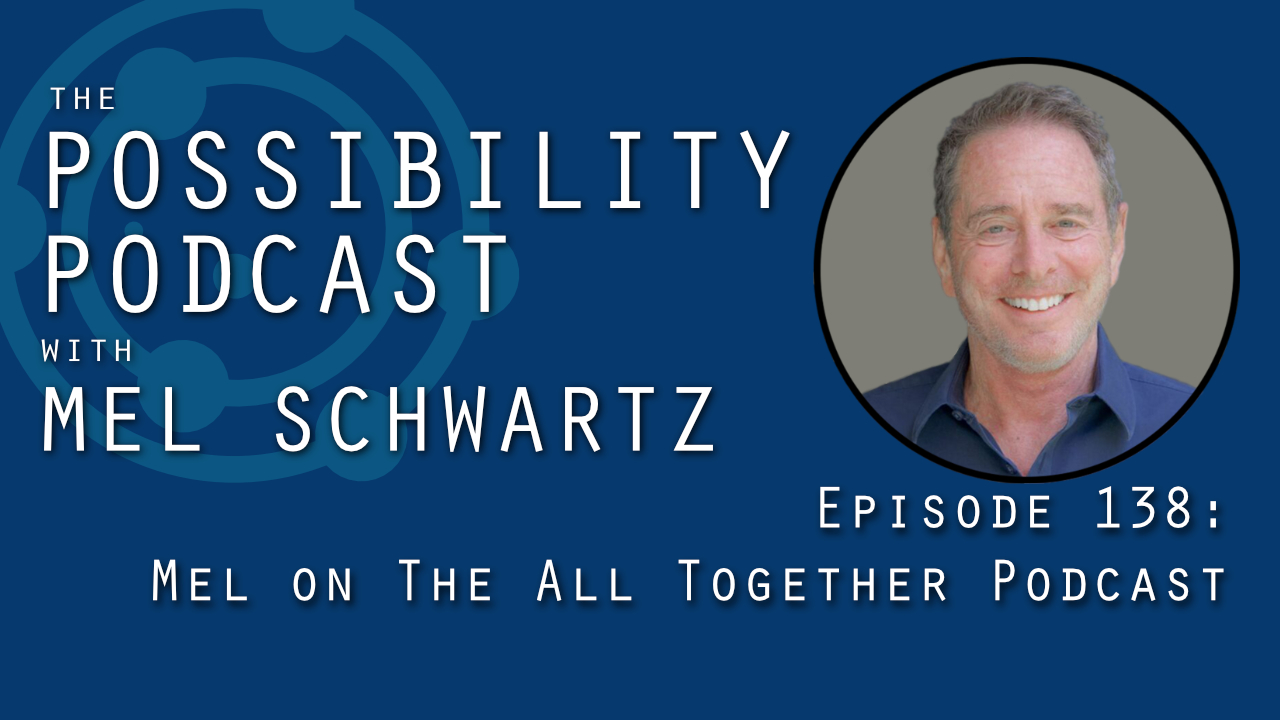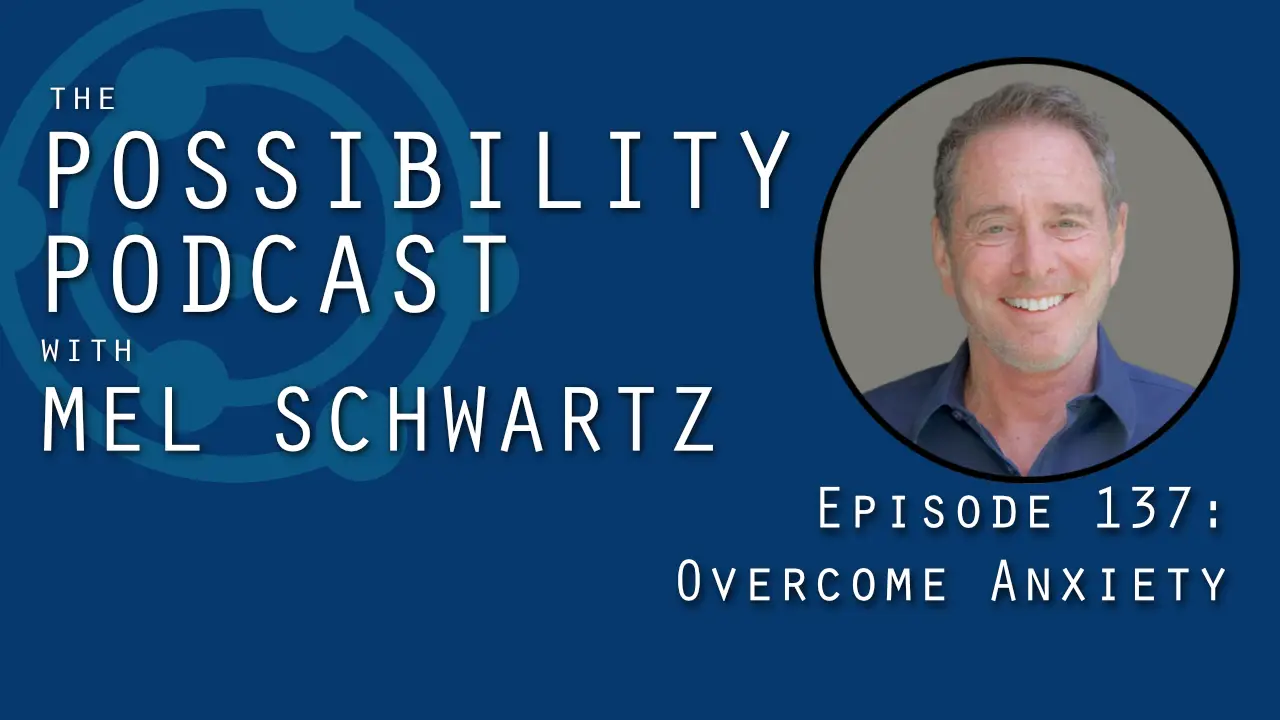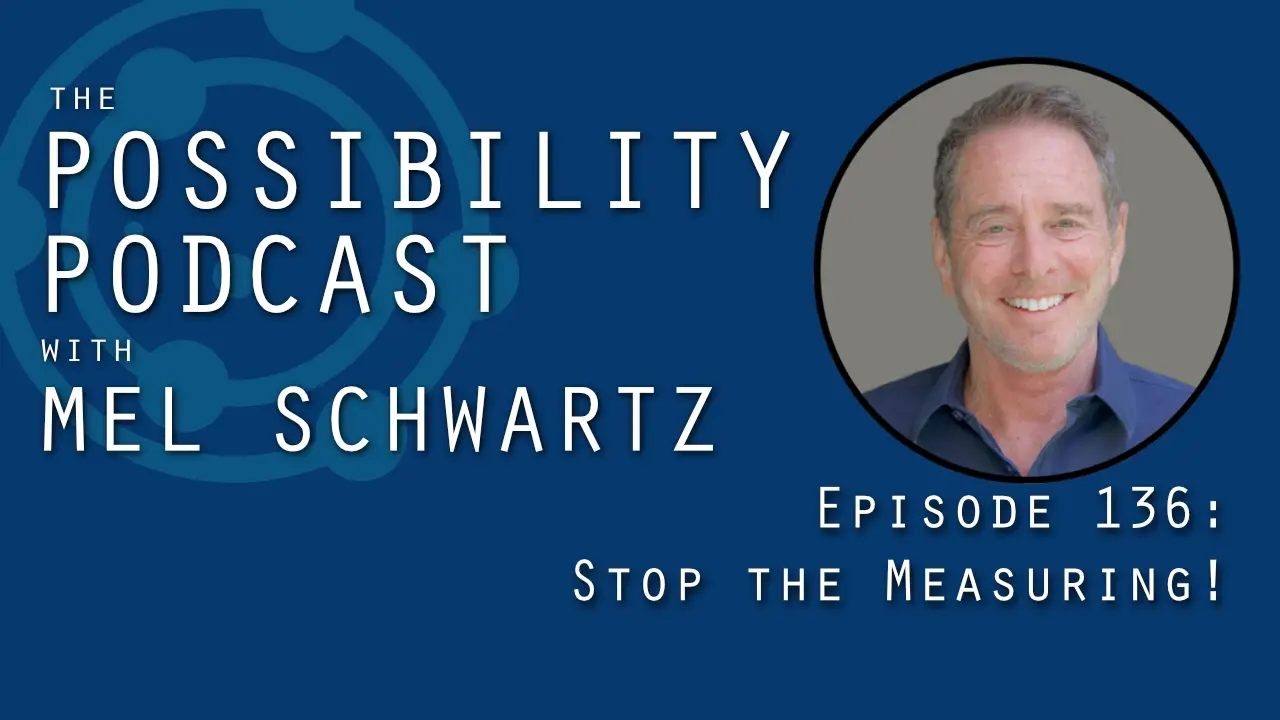Podcast: Play in new window | Download
Subscribe: RSS
In episode 067 of The Possibility Podcast with Mel Schwartz, we examine how healthy, productive relationships follow the same rules as the elementary particles that make up the universe, and us. It makes sense!
Learn…
Interested in bespoke marriage and relationship counseling from Mel Schwartz? Reach out!
- …the bizarre, scientifically proven nature of entangled particles of matter
- …what quantum entanglement can teach us about relationships
- …how our nature moves toward selflessness in a healthy loving relationship
- …the art form that is a successful, healthy, loving romantic relationship
- …why reality is actually subjective, and what that has to do with how you view your partner
How would your loving relationships be if you treated them like works of art? Let me know in the comments!
Want to watch this episode?
Transcript of The Possibility Podcast with Mel Schwartz #067
Hi everyone. Welcome to today’s episode of the Possibility Podcast . I’ve entitled today’s discussion, the Quantum Entanglement of Relationship. So I’m going to begin with the assumption that most of you don’t know what I mean by this. Those of you who have read my book, The Possibility Principle, are familiar.
So we’ll start at the start. What do I mean by this term, quantum entanglement? Quantum physics discovered that reality is altogether different than what we think it is. In a famous thought experiment between Einstein and Niels Bohr 90 some odd years ago, and ultimately all of the experiments in quantum physics, they have found that two particles, let’s call them photons, particles of light, when they exist as a pair, as twins, think of it that way; no matter how far removed they are from each other, they continued to have a shared state. They are as one. This had caused Einstein to say “God doesn’t play dice with the universe. That’s ridiculous.” He believes in cause and effect.
They’re as one. The experiment was if we changed the rotation of one particle, its twin always has the opposite rotation. What would happen? Well, everyone suggested that the particle that’s been changed, the other one would have to change the still in opposition, but how long would it take?
Niels Bohr said, “Well, no signal will be sent. They are entangled. They’re as one. There’s no signal. They could be half universe apart; they’re still as one.” Well, after the technology and the theorems are available, Einstein loses. Well after his death and after Niels Bohr’s death.
The reality is that in the quantum world, in certain circumstances, there’s a sense of oneness. No different than mystics have always spoken about oneness. The spiritual gurus, one world, one universe, oneness, no separation.
Now, that phenomenon of oneness not only exists in the quantum world, the world of the very small, it exists in our world as well.
There are so many examples of oneness. Sometimes there seem to be intuitive or psychic, but oneness. So I’ve looked at that phenomenon of the oneness of the quantum particles and begun to correlate it to a sense of oneness, at least in romantic relationships, but also in very close, loving familial relationships. But for today’s discussion, I’m going to use the analogy of romantic partnerships.
The experience of falling in love is an experience of oneness. We are separate individuals who come together and become enraptured, and there’s a sense of oneness. Think about a Venn diagram with three circles. Well, the inner circle is us, and that’s the shaded part. When falling in love, the individual starts to diminish and the oneness becomes significant and profound. That’s what falling in love is about.
Now, why do we fall out of love? A lot of reasons. I’m going to address just one reason today, which is: we come out of that sense of one oneness.
All too soon we retreat into individual and ultimately competing selves for a host of reasons. So it’s that fall from oneness that creates havoc in our lives. The way we go after relationships and the way we communicate with each other becomes individualistic and competitive and gets rooted in right versus wrong arguments, and we dissipate. We separate out from that oneness, and that’s where we get into trouble.
So we fall into this illusion of separation and that sets up disharmony. Our individual egos start to compete with each other. Old wounds from our past get in the way. We have coping mechanisms and insecurities and self-doubts and hurts and pain, and they all pile on and we separate out into competing individuals.
Now, a relationship is a participatory experience. We both have to participate in a relationship. We come to think of each other as immutable objective identities.
We’re not. The quantum reality of relationship is that the relationship informs and defines how we each see each other. We are different people to, let’s suppose we have 10 different friends. I have 10 different friends. They all know a somewhat different Mel, because I am interacting and relating to them on different levels. There is a quantum experience of oneness in every relationship.
The point I’m making here is to not fall into the myth of objective truth in relationship. What we need to do is deal with each other subjectively with compassion and caring and harmony and return to the sense of oneness. We impact each other. The relationship impacts us. Everything is informing everything else. There is a quantum participatory uncertainty in the relationship.
There is no linear feedback loop of you and me, but that’s the way we come to think of it. Think of it instead, in a circular way, there is you and me and our relationship and everything is affecting everything else.
Now, what happens in our relationships is when we separate out into oneness, and by the way, I’m not suggesting that a loving relationship, you don’t still have an individual identity. By all means you do. But when we separate out, we default into right versus wrong. A win lose strategy. Now that can’t possibly work in a relationship.
Think of it this way. You’re on a seesaw and if you go down, the other person goes up. We’re in the seesaw of right versus wrong and the battle of right and wrong. This can’t work because a relationship is a circular energy system. The goal is to keep the energy of the relationship positive. If I can keep the energy of the relationship positive, that’s going to serve you and it’s going to serve me. But if I have to prove to you that you’re wrong and I’m right, if it’s a win lose, that has to mean it’s a lose lose.
If I have to make you wrong, how’s that gonna work out? It can’t. If I have to defeat you and conquer you, I’m defeating myself. We’re in the same energy loop of relationship. We have to intervene in the energy field with a win-win attitude. Not right versus wrong, but win-win.
Imagine you’re out in a row boat together far from shore and no life preservers, and the boat starts to take on water and you’re at risk of drowning. Would it make sense to say, “Hey, that hole in the boat, that wasn’t my fault. That was your doing.” We’re both going under. We need to bail the water in a relationship. We have to come out of blame and fault and understand the quantum energy system of a relationship.
So very often I’ll hear a couple say, “Well, it’s not my issue. It’s her issue.” How silly.
Her issue becomes my issue. It becomes our issue. Everything spills out into everything else. We have to come at this from a collective harmony. We both have individual issues. We both have hurts and wounds. They’re going to play out.
Let me give you an example. I’m going to make up the names of course, to predict identities. I was working with a couple, I’m going to call them Judy and Harold. Many years ago, they were recently married, second marriages.
Now, Judy, I knew through my individual work with her, she had issues around confrontation based upon her childhood. She was a people pleaser. She didn’t want to upset. She decided she needed to defer to her former husband because she didn’t want him upset, and she was worried about how that would impact the children. So she would never find her assertive voice with him. Now, this disturbed her new husband, Howard, very, very much.
Because he felt betrayed. Judy seemed more attuned to her former husband than her current husband.
Now, what was Howard’s issue? Howard had abandonment issues from miss childhood. He didn’t feel safe in relationship. Now, can you see how their separate issues became their issue, her need to please and not confront? He personalized it and interpreted that to mean she didn’t love him and wasn’t committed to him, and his insistence is she confront her husband was pushing on her discomfort. Her issue, his issue become our issues. There is no separating of issues. Now, there is opportunity for individual growth and ownership of my issue. A relationship provides the perfect opportunity for challenge and growth. The question is are we going to take the opportunity for growth? If we rethink relationship as an art form, the art of relationship, it’s about the cultivating of a relationship in harmony, without judgment, without anger, without acrimony, realizing it’s an opportunity for us to both evolve and learn and grow together.
To move from a state of stuck being into a process of becoming. Individually in our lives, that’s what we want to do: Move from being to becoming. A relationship is the perfect vehicle to opportunities. This shift from being to becoming. Now, we can only do this by learning that it’s selfless selfless to not be self-interested. In other words, when we can become selfless and care for the other with empathy and compassion, given the circular feedback loop and energy, if I can be selfless and care for the other, I’ve improved the energy field of the relationship I exist in. Now, barring my partners having some terrible dysfunction, that can only create a resourcefulness in the relationship. If I become selfless and tend to and have compassion and empathy, it should come back into that positive feedback loop and serve me as well. If it doesn’t, then I have reason to question the relationship.
But until I do that, I shouldn’t be questioning the relationship. So if you look at your relationships as a quantum entanglement where there isn’t a genuine separation, don’t default into right versus wrong and blame. Win lose is lose lose. Come into the quantum entanglement of oneness in a relationship, foster empathy and compassion and caring for each other move into the art form of relationship, which sadly nobody ever taught us how to do. Relationships should be a beautiful, evolving, multi textured experience in life, a true art form.
So rethink relationship, rethink separation and individuality, and move back or move for the first time into one is, and not just with a romantic partner; in friendships, in family relationships, wherever you can.
Well that’s it for today’s episode on the Quantum Entanglement of Relationship. There’ll be more to come on this and other related topics. I hope you enjoy today’s show. Look forward to speaking with you again real soon. Bye for now.
Subscribe to The Possibility Podcast with Mel Schwartz
Don’t miss a single Possibility Podcast with Mel Schwartz! Subscribe for free in iTunes / Apple Podcasts, Spotify, RadioPublic, Spreaker, or wherever you listen to podcasts. Or, simply copy / paste the RSS link directly into the podcast app of your choice!
Please Rate and Review
If you enjoy The Possibility Podcast with Mel Schwartz, please take a moment to rate and review the show in iTunes / Apple Podcasts or Podchaser. It only takes a few minutes, and adding your review is as easy as clicking this link.
Your rating and review helps raise the visibility of The Possibility Podcast with Mel Schwartz, especially on iTunes / Apple Podcasts, which is one of the biggest podcasting platforms today. More visibility for the show means more listeners… and that growth means the show reaches — and helps — more people like you.
Thank you!
Talk With Mel!
Help others when Mel helps you: Contact Mel and find out how you can be a caller on the show and ask Mel a question. He’ll put the Possibility Principle to work for you, and your conversation will be recorded for use in a future episode of the podcast so other listeners can benefit.




